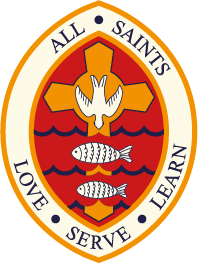Science
Faculty Leader: Mr J Barker
Introduction
Science provides the foundations for understanding the world through the disciplines of Biology, Chemistry and Physics. The All Saints Catholic College science curriculum has been designed to offer our students the chance to engage in a broad course of study covering all three sciences. We want our students to gain a wide range of knowledge and scientific skills, preparing them for post-16 study and beyond.
Throughout their learning, students will develop curiosity about the natural world, insight into working scientifically and an appreciation of the relevance of science to their everyday lives. Practical activities are part of day-to-day teaching and learning activities are appropriate for all students’ abilities; they will also challenge student understanding and allow them to develop their knowledge to a deeper level.
The Curriculum
Our 5-year science curriculum is carefully sequenced to meet the specific needs of the science national curriculum throughout all year groups. It builds on the knowledge students have gained at Key Stage 2 and our long-term and medium-term planning is designed to ensure that the full depth of the curriculum is covered. We have also developed a challenging and substantive teaching model which interleaves KS4 content into Years 7, 8 & 9 and progressively builds in greater challenge as students spiral through the curriculum.
At Key Stage 4 most students are entered for AQA GCSE Combined Science Trilogy. This course leads to two GCSEs in science, covering Biology, Chemistry and Physics.
Alternatively, students can choose to study AQA Triple Award Science which leads to three GCSEs in Science – Biology, Chemistry and Physics. Students have to take all 3 Sciences, there is not the option to take these separately.
Both courses are suitable for students considering studying science subjects at A-Level and degree level.
There are two levels of exam, foundation awarding grades 5-1 and higher awarding grades 9-4. All exams are a mixture of multiple choice, structured, closed short answer and open response. Students will also complete a number of practical experiments in lessons and will be examined on aspects of these experiments as part of the written exam papers.
What can you do with a science qualification?
Science is a subject which is included in the English Baccalaureate. This is the list of subjects which Sixth Form Colleges and universities prefer a student to have studied at least to GCSE level. Science is a compulsory subject because it is an important component in so many careers. A science qualification at 16 opens doors to a wide spectrum of careers because employers are aware of the range of skills acquired during the course. Such a qualification can also lead to many higher level and vocational courses, which in turn can lead on to a vast range of careers.
